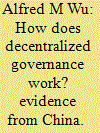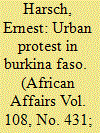|
|
|
Sort Order |
|
|
|
Items / Page
|
|
|
|
|
|
|
| Srl | Item |
| 1 |
ID:
120811


|
|
|
|
|
| Publication |
2013.
|
| Summary/Abstract |
Decentralized governance is often viewed as an effective way to improve public services and government accountability. Many also document the negative dimensions of fiscal decentralization, especially in transition economies; thus, the combination of decentralization and centralized control has gained currency in some countries in recent years. Based on first-hand data and other documentary sources, and using civil service remuneration as an example, this paper attempts to explore how decentralized governance works in China and what hinders decentralization from performing better. The findings show that Chinese centralized control over expenditure in public sector remuneration primarily serves to enhance ministry control. Local bureaucrats, meanwhile, exploit better remuneration to boost their personal interests. This paper argues that political commitment rather than central transfer is greatly needed for utilizing the benefits of decentralized governance.
|
|
|
|
|
|
|
|
|
|
|
|
|
|
|
|
| 2 |
ID:
128521


|
|
|
|
|
| Publication |
2013.
|
| Summary/Abstract |
Asia is the most populous and rapidly urbanizing region in the world today and features 23 of the world's 40 biggest metropolitan areas. In many Asian countries, accelerated economic development, industrialization and urbanization have been accompanied by a growing acceptance that decentralization (the devolution of central state powers, responsibilities and resources to the sub-national scale)4 can lead to more effective and responsive governance in state, provincial, city and regency jurisdictions. This trend toward decentralized governance in Asia has often, but not always, been precipitated by a transition away from authoritarian regimes to more democratic forms of governance. Discourses about the desirability of democratic decentralization have typically emphasized the devolution of central state authority as the preferred means by which to empower communities and to increase the voice and participation of ordinary citizens in governmental decision-making processes that affect their lives and livelihoods. Thus, decentralization policies in urbanizing Asia have aimed to encourage the active involvement of urban residents in addressing shared dilemmas concerning issues such as environmental sustainability, public service delivery, community building and socio-political stability in often densely concentrated and ethnically diverse populations. At the same time, however, decentralization within the contexts of globalization and privatization may circumvent critical aspects of democratic procedure if sub-national government officials use their increased access to state power and resources to nurture clientelistic networks of patronage and/or to tap into wider circles of regional or global economic activity at the expense of local urban development.
|
|
|
|
|
|
|
|
|
|
|
|
|
|
|
|
| 3 |
ID:
087721


|
|
|
|
|
| Publication |
2009.
|
| Summary/Abstract |
Burkina Faso has embarked on a course of decentralization in which elected local governments are assuming a share of decision making over a range of services and activities previously under central authority. But many of these municipalities have also become sites and targets of popular contestation, a reality that has rarely been acknowledged in the official discourses of decentralized governance. By employing social movement research methods, this article examines more than 200 public demonstrations, marches, sit-ins, strikes, riots, and other forms of protest over local issues in 31 of Burkina's urban municipalities, from 1995 to 2007. It finds that both local government reactions and the protests themselves are strongly influenced by the national political context. The analysis highlights some of the main grievances raised by protesters, from opposition to police violence and merchants' frustrations over the management of marketplaces, to residents' concerns about municipal corruption and resistance to neighbourhood displacement resulting from urban 'modernization' schemes. By challenging the performance of Burkina's municipal councils and mayors, ordinary residents are exercising 'voice' and seeking to give some real substance to notions of participatory decentralization.
|
|
|
|
|
|
|
|
|
|
|
|
|
|
|
|
|
|
|
|
|